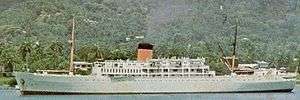TSS Golfito
TSS Golfito was a 8,687 GRT[1] passenger-carrying banana boat of the Fyffes Line, a fleet of ships owned and operated by the UK banana importer Elders and Fyffes Limited. She was 448 feet (137 m) long[2] and had a top speed of 17.7 knots (32.8 km/h)[1]
 TSS Golfito | |
| History | |
|---|---|
| Name: | Golfito |
| Owner: | Elders and Fyffes |
| Operator: | Elders and Fyffes |
| Route: | Southampton or Avonmouth in England to Barbados, Trinidad and up to five ports in Jamaica (Kingston, Port Antonio, Montego Bay, Oracabessa and Bowdin) |
| Builder: | Alexander Stephen and Sons |
| Launched: | 1949 |
| Fate: | Scrapped 1972 |
| General characteristics | |
| Type: | Passenger-cargo ship/banana boat |
| Tonnage: | 8,687 gross register tons (GRT) |
| Length: | 448 feet (137 m) |
| Speed: | 17.7 knots (32.8 km/h) |
History
She was built in 1949 by Alexander Stephen and Sons of Glasgow and scrapped at Faslane in 1972.[3]
Accommodation
She had three passenger decks[4] with cabins for 94 first class passengers,[2] public rooms and open-air deck spaces. These were centred between four large refrigerated cargo holds, two forward and two aft, that could handle 140,000 stems (1,750 tons) of bananas.[4]
Trade
Her main trade was general cargo outwards (mostly British manufactured goods), returning with bananas.[4]
Routing
She was routed on 4-5 week voyages from Southampton or Avonmouth in England to Barbados, Trinidad and up to five ports on Jamaica (Kingston, Port Antonio, Montego Bay, Oracabessa and Bowden) where bananas were loaded through the cool of the night.[4]
Sister ship
In 1956 she was joined by a sister ship, Camito. Together they provided a regular fortnightly service[3] between the UK and the Caribbean.
In the James Bond film Dr. No, either Camito or Golfito can be seen in the background when James Bond meets Quarrel and in some later scenes. The shape and markings are similar.[5]
Notes and references
- Harnack, Edwin P (1964) [1903]. All About Ships & Shipping (11th ed.). London: Faber and Faber. p. 497.
- The UK Passenger Ship Fleet of 1967, Ian Boyle, Simplon Postcards, undated.
- PortCities Southampton, Golfito And Camito: Cargo And Passenger Ships, undated.
- Banana Boats, William H. Miller, The World Ocean & Cruise Liner Society, undated reprint.
- Dr No